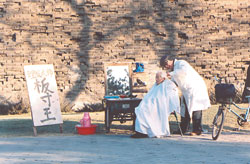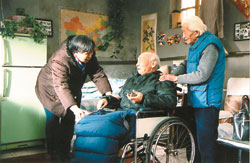A cut above the rest
Every morning, old man Jing Kui takes a stroll through the hutongs of Houhai, and the first thing he does after returning to his low, red-brick house is wind his old clock. The clock has always been five minutes slow and has been a constant companion for much of the 93-year-old's life.
Even barbers need a haircut. Jing Kui has his hair trimmed by a street snipper. The sign says: Barber Master; Short Hair Style. |
What distinguishes Jing from others of his age is his new star status. He plays the lead role in The Old Barber, a docu-drama which recently bagged the Golden Peacock Award, the top award of the 37th India International Film Festival. The role is perfect for a man who has been a barber all his life and has been providing home services to his regular customers for decades.
"I had 400-plus customers, most of whom have died," said Jing who has been snipping away for the last 78 years and retains sharp eyes and a deft hand.
Fame has brought little change to his life as Jing continues to live exactly as before. "I bother about nothing and just live my life peacefully as I always did," he said slowly.
Copper cash
Over his life time, Jing has witnessed many hair style changes from the late Qing Dynasty (1644-1911) to the founding of New China. He has seen big plaits morph into bald heads and parted hair and has counted copper cash, silver dollars and different currencies.
"I am the oldest and have worked the longest," Jing said with pride.
He became an apprentice to a barber in Houhai at the age of 16. Life was hard, busy and irregular. Jing had to attend to clients even at mealtimes. "It often took me three sittings to finish a meal," he recalled. "I had to put my bowl aside and pick up the scissors when clients came in."
Jing set up his own shop at Di'anmen in the early 1930s. His profession gave him great opportunities to meet people from all walks of people: wagoners and warlords, paupers and moneybags.
"I treated them equally. There was no disdain. They were alike in my shop."
Jing was kind with his poorer customers. "I would not ask for money if they could not afford it," he said. Many people crowded to his shop and his business grew.
Scenes from The Old Barber, played by Jing Kui, a 93-yearold scissor’s man, who treasures the moments he shares with his ageing customers. |
He counted many celebrities among his clients, including Ma Zhanshan, a patriotic commander and Shang Xiaoyun, a famed Peking Opera actor.
Jing still remembers his early service to Ma. He dared not to sit down until Ma asked him to. But later, he was in Ma's home every other week like a friend. "I chatted with him and other generals quite often," Jing said.
He even got acquainted with a Japanese woman while offering a massage service. He massaged for free and she "wanted to stay with me when the War of Resistance against Japanese Aggression was over, but I insisted she went home".
Dealing with different people, Jing soon developed a slick character. "I could not live to this day unless I talked appropriately to suit the occasion," he said.
In the 1950s, Jing's shop was taken over by the government. He then began to provide door-to-door service. That was the start of his 30-year routine of hutong strolls that remains to this day. "I could not stop haircutting or saving," Jing said.
But now, he had few clients most of them were dead and no apprentices.
Movie hero
Jing was cast in the movie The Old Barber last year and is now a familiar face.
The movie was praised for "its faithful description of an old man's ordinary and tranquil life". But Jing said to the director Hasi Chaolu: "I can do better. Make it once more."
This was not Jing's first public appearance. In 2001, a documentary named Uncle Jing and His Clients was produced and shown on CCTV.
This documentary was what brought Jing and director Hasi Chaolu together. Hasi, a filmmaker from North China's Inner Mongolia Autonomous Region, watched the documentary and could not shake Jing's image away. He came to Beijing last year and found his actor in a hutong.
"I found my actor first and then my script," said Hasi. He co-operated with Jing for four months on this film.
Jing thought making a movie was no more than a "videotape of what I say and what I do". When he found there were scripts involved, he got nervous, fearing he might forget the lines.
Director Hasi considered relieving Jing's anxiety by using his own dialogues instead of the scripted lines. But Jing would have nothing of it and went to great lengths to memorize his lines.
He struggled day and night and even resorted to hypnosis to treat his insomnia brought on by all the nervousness.
Jing was as concerned about his health as his lines. "I dreaded spoiling the movie and the investment on it, in case something happened to me."
The movie has made little difference in his life, except that now he leads a quieter one with fewer clients to serve.
He lives separately from his six children, although a son and a daughter live in the same neighborhood. "I just don't want to bother them," he said.
The movie poster hangs above his headboard; the vest he is shown wearing is the same he wears every day.
A quiet man, Jing's biggest hope is that "every person should come into the world clean and neat and leave the same way".
(China Daily 01/23/2007 page19)
















